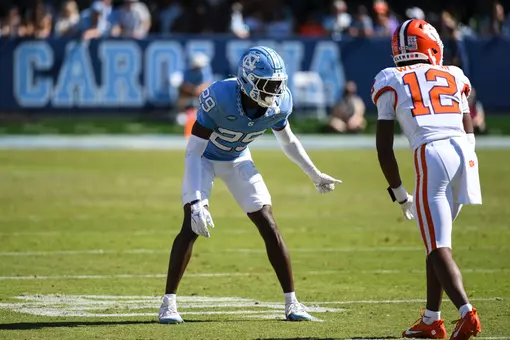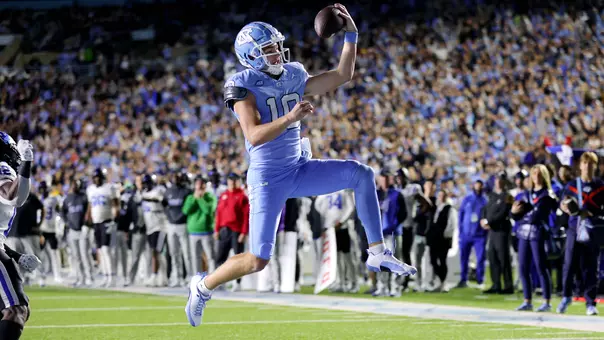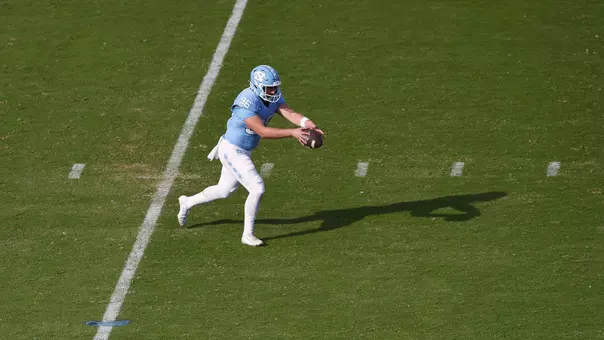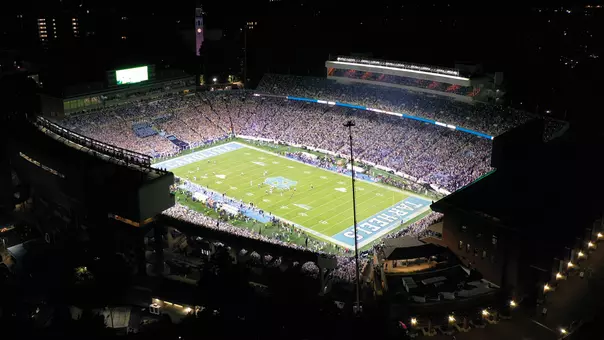University of North Carolina Athletics
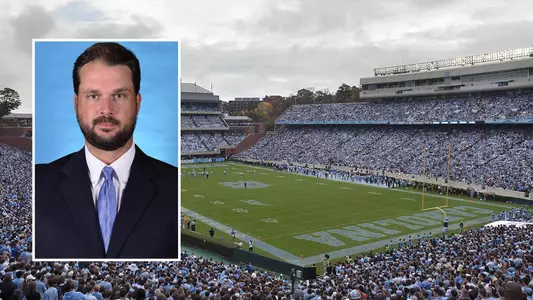
Five Questions With Jason Tudryn
July 31, 2017 | Football
by Jeff Greenberg, GoHeels.com
1. When you were hired in 2014 for this position, Director of High School Relations, how many teams incorporated this type of position into their coaching staffs?
"I don't have exact numbers but I would estimate that half of the programs in the ACC had a position like this on their staffs. Some may have put under the label of "player development" or "personnel director" but the concept was similar. The size and scope of recruiting in college football has evolved so much in the last decade that programs need more personnel and infrastructure to manage recruiting activities. The recruiting calendar has grown and with that the rules around recruiting have become more complex and are changing every year. Add in the fact that camps have evolved from one-week skill development camps to multi-dimensional recruiting events and that has placed them under a different umbrella than in the past. That's an area Coach Fedora was focused on when he hired me. He wanted me to run our camps and our clinics. Then he wanted me to help in building relationships in recruiting and evaluating players and their development. One thing that hasn't changed in recruiting is the importance of our relationships with high school coaches. The territories that our coaches cover can change as the staff changes, but I can serve as a consistent point-of-contact for our high school coaches. Having walked in their shoes in different states, including here in North Carolina, I know a consistent relationship between high school and college programs is important in building trust and credibility. That doesn't just entail shaking hands and talking football. It also includes me being a resource to the high school coaches in what their players need to be doing to become eligible and stay on top of all of the compliance rules with the NCAA. All of these are examples of why college programs are transitioning from having a single recruiting coordinator to having recruiting teams on staff to manage all aspects of modern-day recruiting."
2. How did you end up being the coach hired into this position at UNC?
"It's crazy how things work sometimes. I had been a college coach when I first got done playing, and I came from a coaching background with my dad having coached high school football for over 40 years. Then I went to south Florida and coached high school football for about 10 years. I really wanted to be down there in that intense football environment. There was no better place to get involved with that level of talent and be exposed to major college football recruiting. Three kids later we decided we wanted to find a place to raise our kids that could offer great educational opportunities and a great community. We happened to be vacationing on the Outer Banks and heard Carrboro was opening up a high school. Next thing you know I'm starting the program there and we moved to North Carolina. But I was never angling for a job at UNC. We were doing really well at Carrboro. I would come to practices at UNC when I could and observe and learn. Then Coach Fedora got hired and Coach Kap's son and my son played baseball together. He approached me one day and asked me if I had ever considered getting back into college coaching. I've always been a UNC fan and next thing you know I'm sitting in front of Coach Fedora and the rest is history."
3. Do you focus on building relationships with the high school coaches everywhere, or do focus primarily on the coaches in North Carolina?
"It's a bit of a mix but the priority is here in North Carolina. Having been involved in North Carolina high school football since 2007, I think I have a really great idea of how our state operates. What I mean is having the knowledge of how school systems operate here and how high school coaches have to navigate coaching within these school systems. I feel like I've built up my credibility with them because I was one of them. I can relate to the challenges they face and talk to things that matter to them. I mean I know what it's like to coach the first game in school history and lose 89-0, and then six years later be playing for a state championship. I've been the coach doing laundry after practice and taking the kids home that didn't have rides. I know what they're thinking about when they wake up and what they're worried about when they go to bed. The head high school football coach is a person that I think is immensely important in a community. I value the impact they have on young men in their communities and how they can change the lives of the guys in their locker room. I still bounce ideas off of coaches I've been friends with for years and at the end of the day coaches like talking ball with each other. The other reason my focus is on North Carolina is the amount of highly talented players we have here in our state that don't stay and play their college ball in-state. So yes, I'll branch out to areas outside the state that I'm familiar with, but there's always a ton of work to be done in-state. We have said since the day we got to UNC that our focus in recruiting will always start with players here in North Carolina."
4. You've mentioned that college football and recruiting in college football have changed and keep changing. So how has that changed the scope of your job since you first came to UNC?
"When I came in I had those three specific buckets I mentioned before with camps, clinics and building relationships. But there was no roadmap in how to do all of that. You spent a lot of time talking with folks and picking their brains on what worked in the past and what could be better moving forward. So in a sense, a lot of it was trial and error type situations. Now, I feel like I've been able to develop my own strategies and my own organization with each of those buckets. As a result, I feel like we have an operation that runs a lot smoother than when I first started and we're better at what it is we do here for the program. Before we were just trying to make it to the end of each week like a "survive and advance" type mentality. Now we can project our calendars out months ahead and execute with more efficiency and a higher degree of success. I think we're better resources for our coaching staff and I feel like we're better resources for our players and their development."
5. In your eyes, having started a football program from ground zero yourself, how has the program evolved under Coach Fedora in his time here?
"I feel strongly that our program has grown leaps and bounds in many areas. In recruiting, even when I was coaching at Carrboro, I've always felt the strength of Coach Fedora and his staff was the genuine authenticity of their approach and how they interact with high school coaches, players and their families. You really felt like you knew his staff for years. They weren't thinking about where they needed to go next. They stayed in the present and listened to what you had to say. That's something Coach Fedora refuses to compromise on and as a former high school coach that goes a long way in my book. It's something I hear from my friends around the state all the time when they're giving me feedback on how we're doing things here at UNC. As a result, another area where we've grown is the caliber of player we're able to attract to UNC. When coaches and players see that they can trust you and that you'll look after their best interests when they come to Chapel Hill, well then the pool from which you recruit from grows wider and deeper in terms of talent. Winning helps of course and we've been able to put wins on the board as well, but people want to trust the coaches they're going to play for in college. I feel like we've built up a strong level of trust here and everywhere we recruit and the results are starting to turn in our favor on a more regular basis."
1. When you were hired in 2014 for this position, Director of High School Relations, how many teams incorporated this type of position into their coaching staffs?
"I don't have exact numbers but I would estimate that half of the programs in the ACC had a position like this on their staffs. Some may have put under the label of "player development" or "personnel director" but the concept was similar. The size and scope of recruiting in college football has evolved so much in the last decade that programs need more personnel and infrastructure to manage recruiting activities. The recruiting calendar has grown and with that the rules around recruiting have become more complex and are changing every year. Add in the fact that camps have evolved from one-week skill development camps to multi-dimensional recruiting events and that has placed them under a different umbrella than in the past. That's an area Coach Fedora was focused on when he hired me. He wanted me to run our camps and our clinics. Then he wanted me to help in building relationships in recruiting and evaluating players and their development. One thing that hasn't changed in recruiting is the importance of our relationships with high school coaches. The territories that our coaches cover can change as the staff changes, but I can serve as a consistent point-of-contact for our high school coaches. Having walked in their shoes in different states, including here in North Carolina, I know a consistent relationship between high school and college programs is important in building trust and credibility. That doesn't just entail shaking hands and talking football. It also includes me being a resource to the high school coaches in what their players need to be doing to become eligible and stay on top of all of the compliance rules with the NCAA. All of these are examples of why college programs are transitioning from having a single recruiting coordinator to having recruiting teams on staff to manage all aspects of modern-day recruiting."
2. How did you end up being the coach hired into this position at UNC?
"It's crazy how things work sometimes. I had been a college coach when I first got done playing, and I came from a coaching background with my dad having coached high school football for over 40 years. Then I went to south Florida and coached high school football for about 10 years. I really wanted to be down there in that intense football environment. There was no better place to get involved with that level of talent and be exposed to major college football recruiting. Three kids later we decided we wanted to find a place to raise our kids that could offer great educational opportunities and a great community. We happened to be vacationing on the Outer Banks and heard Carrboro was opening up a high school. Next thing you know I'm starting the program there and we moved to North Carolina. But I was never angling for a job at UNC. We were doing really well at Carrboro. I would come to practices at UNC when I could and observe and learn. Then Coach Fedora got hired and Coach Kap's son and my son played baseball together. He approached me one day and asked me if I had ever considered getting back into college coaching. I've always been a UNC fan and next thing you know I'm sitting in front of Coach Fedora and the rest is history."
3. Do you focus on building relationships with the high school coaches everywhere, or do focus primarily on the coaches in North Carolina?
"It's a bit of a mix but the priority is here in North Carolina. Having been involved in North Carolina high school football since 2007, I think I have a really great idea of how our state operates. What I mean is having the knowledge of how school systems operate here and how high school coaches have to navigate coaching within these school systems. I feel like I've built up my credibility with them because I was one of them. I can relate to the challenges they face and talk to things that matter to them. I mean I know what it's like to coach the first game in school history and lose 89-0, and then six years later be playing for a state championship. I've been the coach doing laundry after practice and taking the kids home that didn't have rides. I know what they're thinking about when they wake up and what they're worried about when they go to bed. The head high school football coach is a person that I think is immensely important in a community. I value the impact they have on young men in their communities and how they can change the lives of the guys in their locker room. I still bounce ideas off of coaches I've been friends with for years and at the end of the day coaches like talking ball with each other. The other reason my focus is on North Carolina is the amount of highly talented players we have here in our state that don't stay and play their college ball in-state. So yes, I'll branch out to areas outside the state that I'm familiar with, but there's always a ton of work to be done in-state. We have said since the day we got to UNC that our focus in recruiting will always start with players here in North Carolina."
4. You've mentioned that college football and recruiting in college football have changed and keep changing. So how has that changed the scope of your job since you first came to UNC?
"When I came in I had those three specific buckets I mentioned before with camps, clinics and building relationships. But there was no roadmap in how to do all of that. You spent a lot of time talking with folks and picking their brains on what worked in the past and what could be better moving forward. So in a sense, a lot of it was trial and error type situations. Now, I feel like I've been able to develop my own strategies and my own organization with each of those buckets. As a result, I feel like we have an operation that runs a lot smoother than when I first started and we're better at what it is we do here for the program. Before we were just trying to make it to the end of each week like a "survive and advance" type mentality. Now we can project our calendars out months ahead and execute with more efficiency and a higher degree of success. I think we're better resources for our coaching staff and I feel like we're better resources for our players and their development."
5. In your eyes, having started a football program from ground zero yourself, how has the program evolved under Coach Fedora in his time here?
"I feel strongly that our program has grown leaps and bounds in many areas. In recruiting, even when I was coaching at Carrboro, I've always felt the strength of Coach Fedora and his staff was the genuine authenticity of their approach and how they interact with high school coaches, players and their families. You really felt like you knew his staff for years. They weren't thinking about where they needed to go next. They stayed in the present and listened to what you had to say. That's something Coach Fedora refuses to compromise on and as a former high school coach that goes a long way in my book. It's something I hear from my friends around the state all the time when they're giving me feedback on how we're doing things here at UNC. As a result, another area where we've grown is the caliber of player we're able to attract to UNC. When coaches and players see that they can trust you and that you'll look after their best interests when they come to Chapel Hill, well then the pool from which you recruit from grows wider and deeper in terms of talent. Winning helps of course and we've been able to put wins on the board as well, but people want to trust the coaches they're going to play for in college. I feel like we've built up a strong level of trust here and everywhere we recruit and the results are starting to turn in our favor on a more regular basis."
WBB: Post-Duke Conference - Feb. 15, 2026
Sunday, February 15
UNC Women's Basketball: Tar Heels Fall at Duke, 72-68
Sunday, February 15
UNC Men's Lacrosse: Tar Heels Cruise Past Iona, 23-7
Sunday, February 15
UNC Baseball: Winslow Walks-Off Heels to Sweep Series vs Indiana
Sunday, February 15











